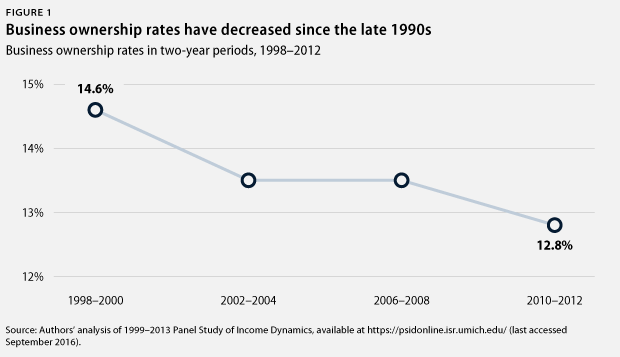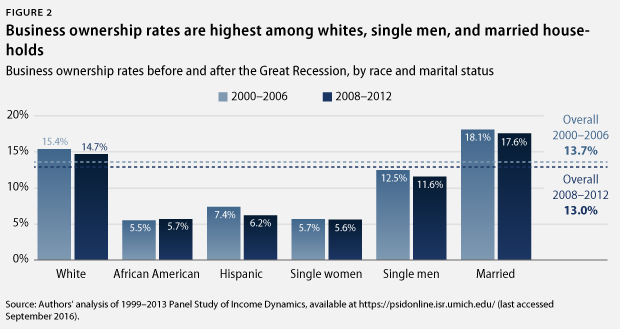Entrepreneurship is a key driver of U.S. economic dynamism and leadership in the world economy. While many of the academic and policy discussions around promoting entrepreneurship have focused on technology startups and other innovative small businesses, the vast majority of small businesses do not fit that stereotype. The overwhelming majority of small businesses are local shops, restaurants, and services, which play a significant role in building a strong foundation for local communities and national economic growth and development. A sound economic policy is not just about finding the next Steve Jobs; it’s also about creating Main Street jobs.
A growing body of research shows that the middle class plays a central role in forming and running these small businesses. However, the reduced economic security of the middle class, which was magnified substantially by the financial crisis and the Great Recession, has meant that entrepreneurship has been largely the realm of upper-income and financially secure households. As the Center for American Progress demonstrated in its recent report, “Raising Wages and Rebuilding Wealth,” middle-class economic security in the form of wages and wealth has begun to recover in recent years, but much more remains to be done to restore a high-pressure, full employment economy. Entrepreneurship is an important part of the equation in both creating, and benefiting from, strong demand in the economy.
Similar to CAP’s recent analysis on wages and wealth overall, previous CAP research has shown that entrepreneurship has been on a long-term decline since the early 2000s. This report finds that this trend continues: Looking at all households who are earning income, business ownership steadily declined from 14.6 percent in the period from 1998 to 2000 to 13.5 percent in the mid-2000s to 12.8 percent by 2010 to 2012.

The overall lower rate of business startup since the 1990s is more than simply a statistic. It means that America is also losing out on untapped talent. CAP’s report “1 Million Missing Entrepreneurs” found that there would be 1 million more entrepreneurs in the economy today if startup rates had kept up pace from the 1990s.
These challenges are even starker for many communities of color, for women workers, and for low-income families. The authors’ analysis using the Panel Study of Income Dynamics, or PSID, shows that African American households and Hispanic households have lower rates of business ownership than white households. Single women have lower rates of business ownership compared with single men, and both have lower rates than married households.
We also find that African Americans are 5 percent less likely to have a business in their household compared with white households—even at the same levels of income, wealth, and education—and Hispanic households are 6.7 percent less likely. Single women are 3.9 percent less likely to have a business compared with single men. These losses are particularly painful, as entrepreneurship is an important strategy for economic development in neighborhoods and cities, as well as for economic mobility for these workers and families.

This report focuses on the challenges to entrepreneurship that people of color* and women face. It explores the role that lower levels of income and wealth play for people of color and women in their ability to start a business. It examines the structural barriers, such as lack of access to informal entrepreneurial training and networks, more difficulty securing startup capital and business loans, and other challenges to tapping the entrepreneurial spirit. In addition, the report also looks at broader economic factors, such as aggregate demand and competition, as well as gender inequity and other basic public policy challenges, which may also affect people of color and women more or differently. While this report is primarily focused on promoting people of color entrepreneurs and women entrepreneurs, it notes that any of the tools proposed would apply broadly to the small-business community.
This report also proposes policies to help people overcome the barriers to becoming entrepreneurs. These include: enhancing the State Small Business Credit Initiative to address the wealth gap and expand access to capital; developing apprenticeship programs to provide training and hands-on experience for future entrepreneurs; fostering early training and education to encourage entrepreneurship among young people; and creating “one stop shops” and Self-Employment Assistance Programs, or SEAPs, to help people start businesses. The report also promotes broad progressive policies that will help raise wages and rebuild wealth for all Americans both to support small businesses and to encourage others to start small businesses.
Of course, starting a business is no guarantee of success—only two-thirds of small businesses survive at least two years, and only half will survive past their first five years. But this report finds that they present an important opportunity for middle-class economic security: Indeed, the authors’ calculations with the PSID find that African American small-business owners weathered the Great Recession with a financial position seven times stronger than that of ordinary workers.
Overall, this report shows that progressive policies can help break down the barriers that people face in starting their own businesses and help them become successful business owners. Making entrepreneurialism a career choice open to all will help families build wealth; create opportunities for jobs and mobility in disadvantaged communities; and support a robust, inclusive, and growing economy.
* This report’s use of the term “people of color” includes the demographics of African Americans and Hispanics. Due to small sample sizes of Asian Americans and other racial and ethnic minorities in the PSID, statistically significant figures could not be calculated for these demographic groups.
Kate Bahn is an Economist at the Center for American Progress. Regina Willensky is a Policy Analyst with the Economic Policy team at the Center. Annie McGrew is a Special Assistant for the Economic Policy team at the Center.